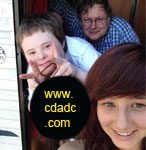

The problem with Down Syndrome Kids
The problem with “Down Syndrome Kids” and “Down Syndrome Children”
The kids and children with Down Syndrome are worth their weight in gold, and any society that cant see the benefit our kids bring with them, is not a worthwhile society to be part of.
The problem is all in the sequence.
When you put “Down syndrome” before the words kid or child, you are seeing the syndrome first and child second. You are seeing the condition of Down syndrome as being more important than the kid in other words.
You may not intend to do that, but that is what you are doing.
The correct language is like “children with Down Syndrome” or “kid with Down syndrome.
This clearly puts the child first, and the Down syndrome qualifier as not as important.
It is not just a play on words.
Change the wording and you help to change the stereotypes people have of Down syndrome. You are applying pressure at a psychological level, for people to see the kid as the important bit.
Examples that show how ludicrous the idea of Down syndrome kids and Down syndrome children is when it is spoken out.
1.. Cancer kids – demeaning to a parent and child if their kid is referred to that way. How would you feel about a parent who referred to their own child as a cancer kid? A bit heartless?
2.. Cold kids (kids with colds) – makes no sense at all does it.
3.. Car accident brain damaged kids. I mean look at it, the main focus is car accident, the second focus is brain damaged, and the child comes in third spot.
When dealing with children, it is important to see the child first, so that the child isn’t lost focus of.
What can it tell you about the professionals working with your kid?
Sadly that maybe they don’t have your child as the highest priority, that when they analyse or see things, it will be in relationship to the condition, rather than tot he child. How catastrophic can it it be when the child is not the focus, but the condition is? You may think not much, but it is a minefield once you start to understand.
For example “The speech problems are typical of Down syndrome” and the speech therapy you may be offered wont be tailored to your child but to the condition.
You may think that is harmless, that the two are the same. BUT, in fact, “Kids with Down Syndrome” normally have speech problems for the same reasons as other kids to – often due to ear infections that weren’t cleared up during the formative language learning periods of very early childhood. The speech therapist may not even look further than the Down syndrome. So the glue ear that is caused by infection, and has known effects and consequences on hearing, is what he speech therapy should be aimed at overcoming. The reason I highlight this one on speech, is because it happened to my son, who also has Down syndrome, and the speech therapy he received was having Down syndrome, not for recovering from glue ear. In my opinion, that distinction of being a “Down Syndrome kid” cost him many years of language acquisition, and at the age of 15, we are still trying to develop speech. Others that didn’t have th glue ear, have developed speech mostly better than my son, even without much speech therapy.

Leave a Reply
You must be logged in to post a comment.